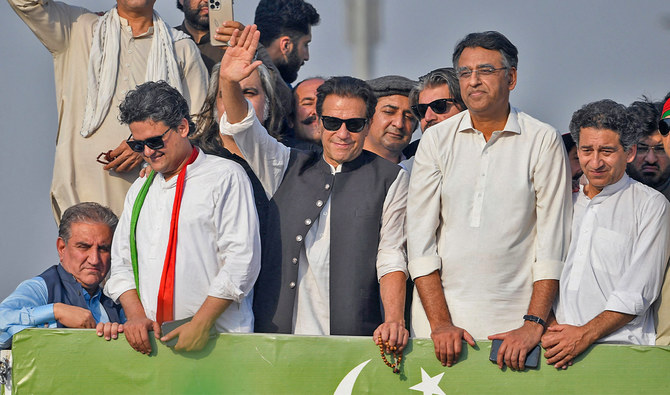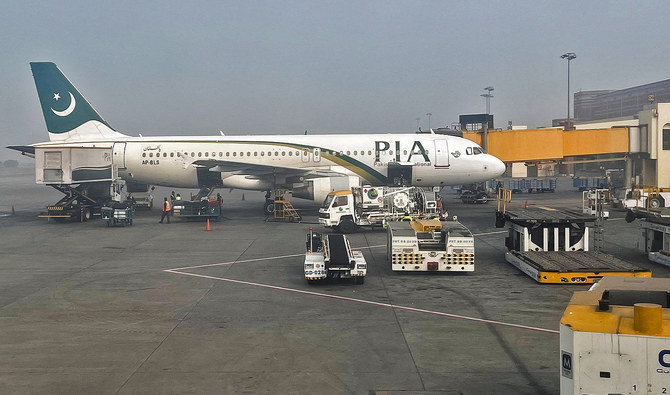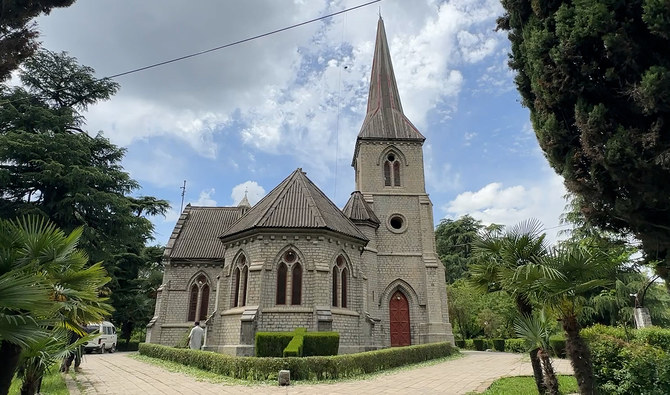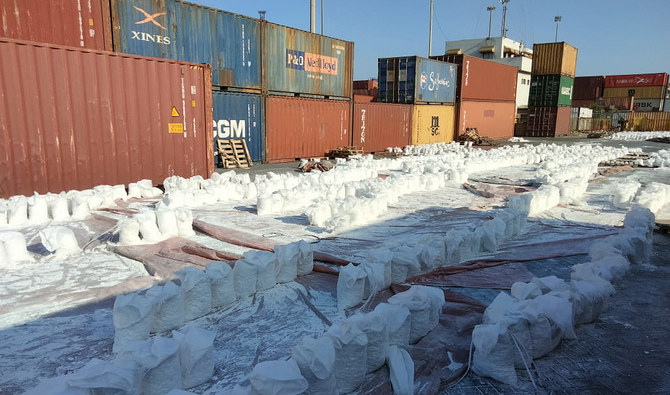ISLAMABAD: Normalcy resumed in the Pakistani capital, Islamabad, on Thursday after ousted Prime Minister Imran Khan called off a protest march in the federal capital, giving the government six days to dissolve assemblies and announce fresh elections.
On Thursday morning, thousands of supporters of Khan’s Pakistan Tehreek-e-Insaf (PTI) party who had gathered at D-Chowk in front of the parliament house, arriving from different parts of the country especially the Khyber Pakhtunkhwa and Punjab provinces, dispersed peacefully following Khan’s address to a charged crowd.
This followed a long day of political drama that included clashes between demonstrators and police, and the arrests of hundreds of Khan supporters across the country.
“We are leaving for our homes now, but will come back again on Khan’s call to topple the government,” Hassan Shirazi, a demonstrator from Pakpattan city, told Arab News.
Shortly after the protest ended, the Islamabad district administration started removing shipping containers to unblock all roads in the federal capital and adjoining Rawalpindi city. Police and other law enforcement personnel requisitioned from other provinces were also seen packing up and boarding buses to go back to their stations.
The administration also reopened Jinnah Avenue, the main protest venue, and all other roads in Islamabad, including Srinagar Highway and Islamabad Expressway. The main Murree Road in Rawalpindi has also been reopened for both sides of traffic, according to Islamabad Traffic Police.
Entry into the Red Zone, which houses important buildings like parliament and the Supreme Court, is however still restricted and allowed from Margalla Road only.
Meanwhile, the federal government has filed a petition in the Supreme Court seeking contempt of court proceedings against Khan for what it says was a violation of the apex court’s directions.
The Supreme Court had on Wednesday ordered the federal government and the PTI to constitute negotiating committees and meet at 10pm to finalize modalities for the peaceful and safe conduct of Khan’s long march to the capital. However, negotiations were not held as both sides claimed the other’s representatives did not show up.
The court had also ordered the government to designate a spot in H-9 where the protesters could rally. However, protesters converged at D-Chowk instead and Khan held his rally on Jinnah Avenue.
Pakistani police fired teargas, baton-charged and detained supporters of Khan on Wednesday to stop them from reaching the capital to demand fresh elections. Clashes between Khan’s supporters and police were reported in multiple cities and the government called in the army to maintain law and order in the capital.
Khan, ousted in a no-confidence vote last month, had urged supporters to march on Islamabad and stay there until the new government was dissolved and a date for a fresh election announced. Khan alleges he was ousted in a foreign conspiracy orchestrated by the United States and has refused to accept the new government.
“I am giving you [government] six days, if you don’t announce elections I will come back to Islamabad again with all Pakistanis,” Khan said as he addressed a rally on Islamabad’s Jinnah Avenue before ending his protest.
“Government has tried every method to crush our Azadi [freedom] March, they used teargas on peaceful protest, our homes were raided and privacy of the homes were violated,” Khan said. “However, I have seen the nation free itself of fear of slavery.”
Khan started his anti-government march from Peshawar on Wednesday morning while the government blocked all roads leading to the federal capital and rounded up supporters.
Khan’s supporters clashed with security forces in major cities, including the southern port city of Karachi and the eastern city of Lahore.
Videos shot by an Arab News reporter on Wednesday evening showed thousands of Khan supporters walking down the capital’s Blue Area business zone toward D-Chowk while police fired tear gas at, and baton charged, them. Supporters had lit fires all the way down the road to D-Chowk in an apparent bid to neutralize the effects of the tear gas but Islamabad police said on Twitter they had set fire to trees and vehicles.
“Police called the fire brigade. Some places were set on fire while the protesters again set the trees on the Express Chowk,” police said. “Security in the Red Zone has been beefed up,” police added, referring to an area in Islamabad where government, judiciary and legislature buildings are located.
Video clips on social media platforms also showed a burning metro station in the city surrounded by hundreds of PTI while a mob torched a prison van in Karachi after clashing with police.
Live local TV footage showed police fighting with Khan’s supporters in Lahore, beating them and in some places breaking their vehicles’ windscreens and bundling them into police vans.
Amjad Malik, an interior ministry official, told Reuters no one had been seriously injured in the clashes.
Interior Minister Rana Sanaullah later said police had carried out a total of 4,417 swoops on Khan supporters’ homes, offices and on protest rallies and had arrested nearly 1,700 people. Of those, 250 were later freed, he said.
“We haven’t stopped anyone from exercising their constitutional and legal right to hold a rally or take part in democratic politics, but we can’t allow anyone to sow violence and chaos,” Sanaullah said.
Pakistan’s Supreme Court meanwhile ordered the government and Khan’s party to negotiate on holding a peaceful public meeting in Islamabad.
Prime Minister Shehbaz Sharif said his government was trying to clear up an economic mess that he blamed Khan for.
“You’ve handed over a sinking economy to us, and now you’re planning sit-ins and protest,” Sharif said in Islamabad. “We are trying to energize this weak economy.”
















